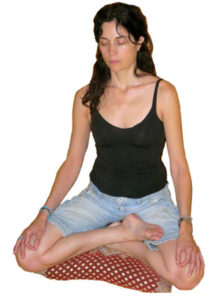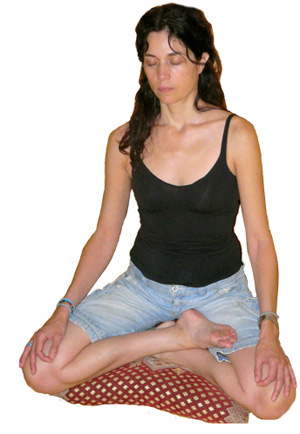
“We are dominated almost all the time by our thoughts and emotions”
❉
Meditation is the space to simply be, to experience only, without interference from the body or mind. It is a natural state, but we have forgotten how to access it. Most of us are dominated almost all the time by our thoughts and emotions. This leads us to think that we are these thoughts and feelings. Methods for meditation are techniques or tools to create an internal environment that facilitates the disconnection of the body-mind, so that one simply is. While it helps initially to take time to practice a structured meditation method, there are several techniques that are practiced in the context of everyday life: At work, at leisure, alone or in company. The methods are necessary only until the state of meditation, of conscious relaxation, awareness and being centered, is part of one, not as a passing experience, but as something as intrinsic as, say, breathing. Meditation is not a mental effort or a way to control the mind. Effort and control create tension, and tension is the antithesis of the meditative state. Furthermore, there is no need to control the mind, but only to understand it and see how it works. The meditator does not need to tame his mind, to be more careful, but to grow more in awareness. The benefits of meditation are manifold. The most important thing is the ability to relax and be aware without any effort. They are useful tools for simply everyone!
Summary of the article “Meditation, in the test tube”:
“Since the 1970s, more than 500 studies have been conducted on the physiological, psychological and sociological effects of this introspective practice, according to a review of the scientific literature by Mónica Rodríguez Zafra, professor of Psychobiology at the University of Distance Education. “During meditation, a physiological pattern occurs that is characterized by a state of relaxed alertness: while a state of relaxation occurs in the peripheral nervous system, a state of activation of the central nervous system also occurs,” says Rodríguez Zafra.
Since the effects are mediated by the central nervous system, training and continued practice in this technique, the researcher adds, produces changes in the way the nervous system responds to external stimuli and the loss of its internal homeostasis. “There is an improvement in the body’s responsiveness and a greater ease in recovering homeostatic balance, which is altered in response to stressful situations or stimuli.”
Can we develop our brains by practicing meditation? Several Tibetan monks with up to 50,000 hours of experience in introspection and a group of beginners took part in a curious experiment in 2005. Neurologist Richard Davidson, from the University of Wisconsin (United States), compared the participants’ brain activity while they meditated. Using neuroimaging techniques, they showed that the monks had high activity in an area of the brain located behind the left side of the forehead, in the left prefrontal cortex. The result, published in the journal Proceedings of the National Academy of Sciences, shows important differences. The measurements recorded a very high amplitude of gamma waves in the monks’ brains because during meditation they managed to synchronize a very high number of neurons. It is believed that gamma waves express the neuronal activity that intertwines distant brain circuits with each other and, therefore, reflect higher mental activity. Davidson states: “Mental training can take the brain to a very high level of consciousness.” Other scientists venture that practicing yoga and meditation could reduce pain. The Japanese Ryusuke Kakigi, from the National Institute for Physiological Sciences in Okazaki (Japan), has compared the brain activity of a yoga teacher while he was introspecting. He was subjected to painful laser stimulation along with 60 other people. Only the teacher did not feel the pain. “We believe that training in meditation techniques caused an extreme psychological change,” say the researchers” («El País»)
A few phrases to reflect on:
“When we seek, we tend to reject what we have.”
“Meditation helps us recover our lost childhood. If everything I experience and see does not surprise me, it is because, while it emerges, or even before it does, I have subjected it to a prejudice or mental schema.”
“Meditation is not difficult. The most difficult thing is wanting to meditate.”
“A loved one is not there so that one does not get lost, but so that one gets lost together.”
“We spend our lives manipulating things and people so that they please us.”
“Whether I like it or not: this is how we tend to divide the world, exactly as a child would do.
This classification is not only egocentric but radically impoverishing and, ultimately, unfair” (…) such a lifestyle makes life a bit exhausting.”
“As long as man has questions to ask himself, he still has salvation.”
“More than 80% of our mental activity is totally irrelevant and dispensable, even more, counterproductive (…) We think a lot about life but we live it little.”
“We like problems because they give us the impression that thanks to them we can be. The real problem is our false problems.”

